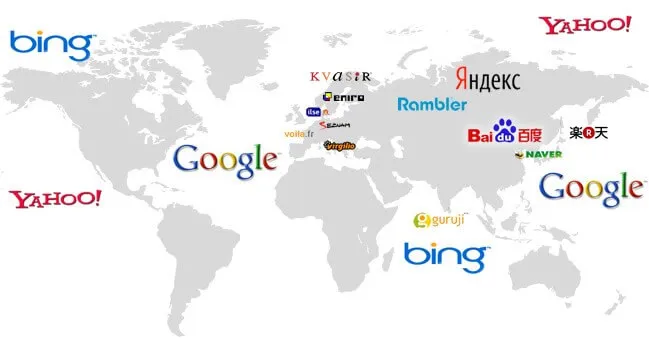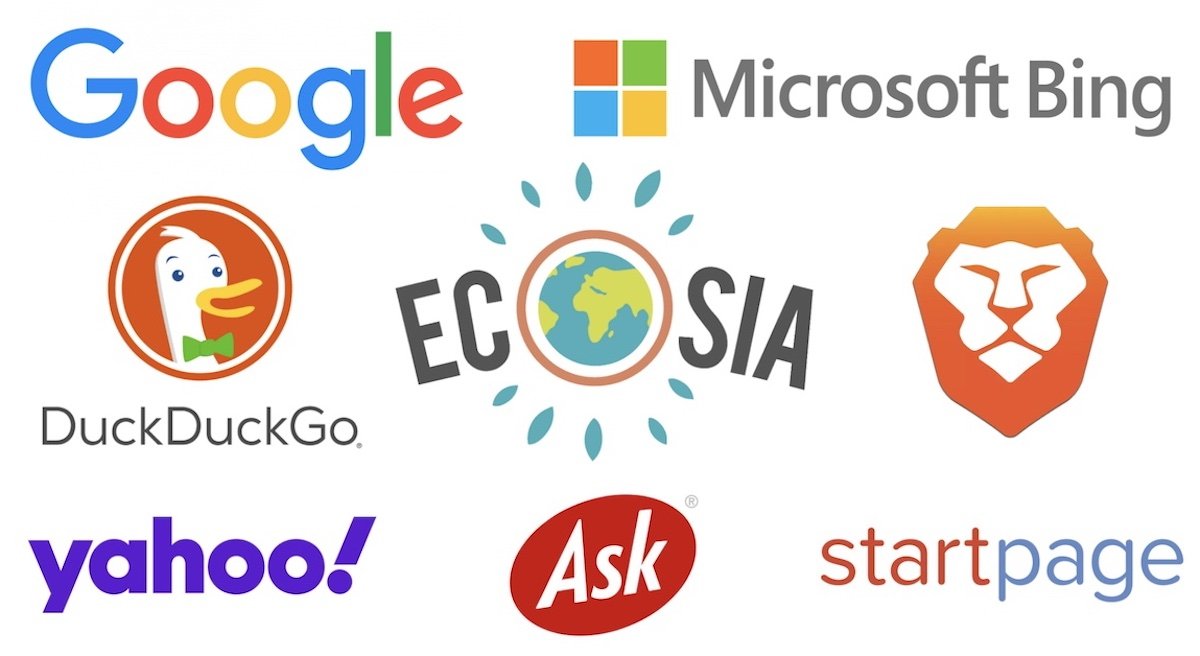Search engines help you find websites, articles, videos, and other things on the internet. They help you find websites, articles, videos, and other things you want to know. Search engines make websites easier to find, which makes more people visit them.
When a person searches for a keyword used on your site, they find you on the search engine results page (SERP), giving you the opportunity to attract them to your site. As a result, you increase your visibility in SERPs and get more traffic and customers.
What is the History of Search Engines?

Search engines took a huge transition from their starting versions. Back in the day, they were only used to view lists made by people. But when people started using search engines for more stuff, the changes started to happen.
After that, they started using web spiders to index pages and present them in a searchable format using the web content database. The oldest search engine that did that was Archie. It was made in 1990 to index FTP websites so that users can search for specific files.
Then we entered into the 90s where Yahoo and AltaVista ruled the search engine market. They used tricky algorithms that were more complex than that of before them. However, they created a better algorithm in mind to rank websites, but it didn’t go successful. The reason behind it was that their algorithms had loopholes that experts could cheat to get their website ranked high.
Then Google and MSN appeared in the market in the late 90s and early 2000s. They presented better algorithms than Yahoo and AltaVista. People started using Google and MSN because they made it easier for people to find what they were looking for. Using them people could type less and search things faster.
Top 10 Search Engines that are Most Popular in 2024
1. Google
Google is the world’s most popular search engine with 88.57% more usage than the second most famous search engine, Bing. Statista and Statcounter reveals that Google dominates the market with 81.74% desktop usage 95.49% mobile usage.
The quality of search results Google made Google the most popular and trusted search engine. It uses sophisticated algorithms to present the most tailored results to users. Google has been changing its algorithms with hundreds of other factors over the years.
Google, the most popular search engine, holds over 85% of the search market and gets 95% of the mobile traffic. Perhaps that’s the reason SEOs make it their top priority to rank websites on Google first. Its large traffic potential has made it the best option to capture organic or paid traffic.
How to do SEO on Google?
When doing SEO for the #1 in our list of top 10 search engines, you need effective keyword research. If your site is new, you want to target broad and long-tail keywords. After conducting keyword research, you need to strategically place keywords in your content, titles, subheadings, meta titles, descriptions, image names, ALT attributes, and anchor text.
Incorporate keywords naturally without overdoing it, as this could negatively impact your ranking. You also need to consider off-page SEO strategies like link building and content promotion. All of this adds to the basics of Google SEO.
2. YouTube

The second best search engine in the list, YouTube, is often considered a social media site because it has comments and likes. However, it is basically a search engine for videos. Just like people create text and visual content for most popular search engines like Google and Bing, they make video content for YouTube.
It shows results in the form of videos whenever you search for a keyword. The video that comes on the top is similar to a website which appears first when you search for a query on Google. Perhaps that’s why people do YouTube SEO to make their videos rank high on the platform.
Just as website owners keep updating their site content to reflect the current date, YouTube professionals repurpose their content to make it evergreen and attract viewers long after it’s posted. This way businesses connect with their audience by sharing their history, customer stories, product demos, or BTS peeks.
How to do SEO on YouTube?
Keywords, headlines, and thumbnails are the three most important things for YouTube SEO. What you gotta do is perform keyword research, create interesting headlines, make eye-catching thumbnails, and use end screens and tags strategically. Like meta descriptions you want to write video descriptions but detailed ones because they’re good for SEO.
YouTube also uses complex algorithms like Google to rank its videos. So when you optimize for YouTube, choose the right keywords, video’s title, description, and tags to increase the chances of your video ranking high in the results. Keep an eye on the click-through rate (CTR) to see how well your videos perform.
3. Bing

In 2023, Bing released an AI Chatbot service called Bing Chat, based on the popular GPT4, before Google. Despite initial user acceptance, Bing’s market share remained low. Bing originated from Microsoft’s previous search engines (MSN Search, Windows Live Search, Live Search). According to Wikipedia, it is the 26th most visited website on the Internet.’
Bing released an AI service Bing Chat in 2023. It was based on the GPT4 model. And this happened long before Google launched its AI program Gemini. Despite these efforts, Bing’s market share remained lesser than Google. But still, it takes 7% of USA searches via desktop and 1.5% mobile searches.
Perhaps this is the reason, Bing is the third-biggest search engine. It offers a Rewards program, offering points to shop on the engine. You can use those points in the form of gift cards, nonprofit donations, and more.
How to do SEO on Bing?
The fun part of Bing SEO is that it almost resembles the SEO strategies of Google. But unlike Google, it reveals its algorithms openly, helping marketers and SEOs to save their time learning them through third party journals and tools. Bing supports quality backlinks from websites that have .edu, .org, .gov, and similar ones in their domains.
Marketers can quickly learn how to elevate websites on Bing rather than Google. With their careful optimization and strategic implementation of SEO techniques, they rank their websites high in less time in the SERPs.
4. Yahoo

Yahoo is another most popular search engine with an average of 1.24% search market share. In the last decade Yahoo had the support of Bing but after 2015, it agreed with Google. After that its searches were powered by Google until October 2018.
But again in 2019 it partnered with Microsoft Bing and improved a lot. Currently, it has over 2% of the worldwide search market share. Bing users would notice that its search results are almost similar to Yahoo results.
Perhaps that’s why the SEO strategies used in Bing are used to optimize websites for Yahoo. Yahoo is one of the bests in our list of top 10 search engines because it’s related to almost every one of its competitors. It was affiliated with Firefox back in the day.
How to do SEO on Yahoo?
Use relevant keywords in meta descriptions, page titles, and alt text. Use Yahoo’s Search Assist tool to find popular keywords. And for PPC campaigns, you can use Yahoo Native tool. When it comes to off-page SEO, Yahoo gives a lot of importance to quality backlinks even though it is no longer a major factor in Google after its March 2024 core update.
To improve your backlink profile, focus on proactive link-building strategies like guest posting and reaching out to authoritative websites. Also consider optimizing but avoid putting text inside images and instead use descriptive alt text with relevant keywords.
Yahoo will accurately index your site, if you integrate JavaScript in your website. Social media presence also positively impacts Yahoo SEO unlike Google.
5. Baidu

Baidu is widely used by Chinese people and holds a search market share ranging between 0.68% to 11.26%. It also shows accurate search results like Google but only in the Chinese language. Despite that it serves billions of search queries per month.
Baidu is loved by Chinese people and holds 40% search market share. They have made its interface resemble Google’s, with a plain white bg with blue colored links and green URLs. It is the second one in our list of search engines that provides snippet results after Google.
Although it is a great search engine, it involves some political interference, such as blocking pro-democracy sites. Besides that, it is a great search engine, especially for the Chinese audience. It has everything that Google has, such as Baidu Maps and Baidu Baike (Chinese Wikipedia version).
How to do SEO on Baidu?
Baidu uses its deep understanding of the Chinese language and demographics to tailor its results to meet the needs of local consumers. Baidu SEO strategies are different from those used in Western SEO practices. For example, if you host your site in China or countries nearby your SEO will perform better than if you host it in western countries. If you want to further improve your SEO, consider using a Chinese domain extension like .cn or .com.cn.
When it comes to achieving good results in Baidu SEO, the most important thing is to have high-quality and consistent content. Baidu’s algorithms prefer original, high-quality content in simplified Chinese. It’s also important to regularly update and refresh your website.
Baidu SEO gives equal importance to both on-site optimization and off-site strategies. That’s why betting quality backlinks for your site alongside making high quality content is critical. Baidu always prioritizes quantity over quality, so make sure you provide users exactly what they need instead of worrying about typical things like word count.
6. DuckDuckGo

DuckDuckGo’s search engine market share is around 0.58%. It is one of the most popular search engines for people who are concerned with user privacy. It won’t track your or store your search history. And you don’t have to use incognito for that. DuckDuckGo currently serves 3 billion searches per month. It is the only one in our list of search engines that focuses deeply on privacy protection.
The one pitfall of this search engine is that it doesn’t have a search index of its own. It generates its search results using other sources. DuckDuckGo has some limitations compared to Google. Google uses algorithms to find the best results from all websites on the Internet. On the positive side, DuckDuckGo has a clean interface, doesn’t track users, and doesn’t have too many ads.
DuckDuckGo still shows ads, but they are not based on your personal information. The website has a simple design and only one search page, which makes it easier to use than other top 10 search engines we’re discussing here. As of 2022, DuckDuckGo has nearly 94 million direct searches every day and is becoming more popular.
How to do SEO on DuckDuckGo?
DuckDuckGo SEO includes adding location data in your content because it doesn’t track users’ locations. By using local keywords and optimizing for local SEO, you increase the chances of your website appearing in relevant searches, especially for privacy-conscious users.
You should also submit your sitemap to other top 10 search engines in our list such as Bing and Yahoo. DuckDuckGo uses data from these sources to index websites because it doesn’t have its own sitemap submission feature.
Finally put your business on Apple Maps. It helps people find you on DuckDuckGo. Also, add your business to Bing Places for Business and Google My Business to be seen on different websites.
7. Yandex

Yandex has now become the most popular search engine for Russians. It has a global market share ranging from 0.5% to 1.16%. Yandex is widely used in Russia and other countries that were once part of the Soviet Union. It is known for its accurate search results in the Russian language.
Yandex.ru is one of the top 10 most popular websites on the Internet. It holds the 8th position in Russia. The Russian search engine, Yandex, has around 2% of the global market share. Yandex also displays quality indicators alongside search results, such as the site quality index (SQI), which shows how useful your site is to users.
Just like Google, Yandex considers if a user’s search has local intent and shows results based on the region. That’s why you need to set a site region in Yandex’s webmaster tools. It also offers free services such as email, real-time traffic maps, music, movies, and photo storage.
How to do SEO on Yandex?
You need to start by specifying your target regions in Yandex Webmaster Tools and listing your business in the Yandex Business Directory. Include detailed regional information on your website to help you get better local search queries.
You also need to focus on engaging with users, as Yandex values positive user behavior. Prefer longer user sessions and genuine interactions on your website to improve rankings. And avoid controlling user behavior, as this can lead to penalties from Yandex. You must improve user experience through authentic engagement strategies.
When you make stuff for Yandex, make sure it’s good and about the things people want. Yandex likes original and well-put-together stuff. Don’t copy or do too much of one thing. Put links inside and add pictures to make it better. If you know this stuff, more people will see your website on Yandex, especially people who speak Russian and in CIS countries.
8. Ask

Ask.com, previously known as Ask Jeeves, has a 0.42% share of the search engine market. It operates on a question/answer format, with users providing most of the answers or participating in polls. Ask.com is a question-answering search engine that gives direct answers to questions instead of just providing a list of links.
Ask.com gets about 36 million visits every month. However, its search results are not as good as Google, Bing, or Yahoo. Ask.com used to be known as Ask Jeeves and has a similar interface to Yahoo, but it’s its own separate search engine, not powered by Bing like Yahoo. Most of its users are from the United States, about 53%.
Ask.com wanted to be a smart search engine that could understand questions in a natural way. It had a character named Mr. Jeeves, who was like a polite and helpful assistant. Ask.com used a special way to organize websites by topic, which is different from how other top 10 search engines in our list does.
How to do SEO on Ask?
Ask’s search algorithm uses ExpertRank to rank sites in specific subjects. This means that you need to have well-crafted, substantive content. Ask’s quality checks are strict, so your content must be clear and relevant to avoid longer indexing times.
Ask.com has improved its search technology to better understand users’ questions without them having to rephrase. This includes features like DADS (Direct Answers From Databases), DAFS (Direct Answers From Search), and AnswerFarm—a database of 300 million question-answer pairs. DADS retrieves structured data from XML feeds, which is important for quickly finding information like TV listings or sports events.
Ask.com helps find answers to questions using AnswerFarm. It helps websites show up higher. To get a new website on Ask.com, get your website link to AnswerFarm. Make sure your website contains good information that follows Ask.com’s rules.
9. Ecosia

Ecosia makes money from ads and uses 80% of it to plant trees. They have around 20 million users and have planted over 180 million trees. Ecosia uses its profits to plant trees. It is popular among people who want to support environmental causes. Ecosia plants trees in vulnerable areas using the profits from user searches made on its webpage or free browser extension.
Ecosia has funded 170 million trees to date. The company is based in Germany and is especially popular there. Worldwide, Ecosia holds 0.11% of the search engine market share. Similar to Yahoo!, Ecosia is powered by Bing.
This search engine has a USP (unique selling point) that makes it favorable in the eyes of people who are concerned with environmental issues. It is also a good alternative for any of our top 10 search engines discussed.
How to do SEO on Ecosia?
Optimizing your website for Ecosia can help eco-friendly businesses. Ecosia is a search engine that cares about the environment and privacy. Because fewer businesses use Ecosia, your website could show up higher in the search results.
To optimize your website for Ecosia, you must focus on optimizing for Bing. Ecosia uses Microsoft Bing’s search engine infrastructure. Bing powers Ecosia, Yahoo, and DuckDuckGo, which together hold a 6.2% market share in the UK. Optimizing for Bing has broader benefits beyond just Ecosia.
When you want your website to show up on Ecosia or Bing, it’s important to know how their search works. For example, Bing likes certain phrases more than other words that mean the same thing. Using these phrases in your website description can help you show up better in searches. Getting links from good websites, using social media to share your stuff, and making sure your website shows up in the right places are also good ideas. Bing Webmaster Tools is like a special tool that helps you make your website work better on Bing and Ecosia.
10. Naver

The last on our top 10 search engines list, Naver, is used by the majority of people in South Korea, with almost 34% of the market share. It is widely used in South Korea for delivering accurate search results in the Korean language.
Naver was the first Korean web portal to create and use its own search engine, starting in 1999. Today, the Naver search engine can be used to find information on a wide range of topics in South Korea. Naver’s interface is only in Korean, and there is no English version of the website.
With Naver, users can find news content, search suggestions, and more on the website. Naver is a localized search engine, which means it doesn’t search and index the entire internet. If you want to rock the South Korean market, make sure your SEO meets the requirements of this popular search engine in South Korea.
How to do SEO on Naver?
Understanding Korea’s search engine landscape is crucial for effective Naver SEO. Naver holds a dominant 59% market share, surpassing Google and DAUM. It is important to optimize for Naver to reach Korean audiences, even though English support is limited. Using browser translation tools can help navigate Naver’s Korean-centric interface.
On Naver, the search page is different from Google. It shows what’s popular in Korea. You need to know this to make sure people can find your stuff on Naver. Naver’s interface includes various properties such as Naver Café, KnowledgeIn, Naver Blog, and Naver Shopping in search results. This integration helps users engage more, spend more time on Naver, and makes it important to strategize across different content types and properties to maximize visibility and impact.
Naver’s search results are different from Google’s. They have different kinds of search results and ads. Naver shows ads a lot, so it’s important to use the right strategies to get noticed. You need to understand how Naver works and use special features like Naver Blog to reach more people. It’s also helpful to use schema markup and social media to help more people see your stuff on Naver.
Why You Shouldn’t Only Focus on Google?
91.58% of people use Google. Bing holds the second place with 3.01% of the market. That’s the reason marketers often focus on getting their websites noticed only on Google. Although Google is the hardest search engine in the list to do well on because of its popularity, it gives the best results compared to all other top 10 search engines we will discuss in this post.
But if you only think about Google, you might not reach people who use other search engines. Those people could include your potential customers too. That’s why marketers should consider other ways to attract visitors beyond just Google.
Below we’ll examine the top 10 search engines, delving into their features, and services, alongside exploring market share and looking at them from SEO’s perspective. Let’s get into our search engine list.
Market Shares of Our Top 10 Search Engines

Google dominates the search engine market, with over 92% global market share. It is the most used search engine today. After that, comes Bing with a market share of 2.5%, followed by Yahoo that holds a share of 1.6%.
Search engines like DuckDuckGo and Baidu have lesser market shares. However, they are popular amongst their target audience, who use these browsers for different purposes and for different reasons. One of those reasons could be the demographic difference. People in Russia use Yandex, and people in China use Baidu the most. They are the 8% who don’t use Google.
Other reasons could be privacy and security. Privacy-conscious people tend to use DuckDuckGo more. But the people who use these less popular search engines are less. That’s why, as per financial reports, Google earns the most, as it did in 2020 when it crossed $180bn in revenue. Bing also generated $7bn the same year.
Privacy and Security in Our Top 10 Search Engines

The top 10 search engines we discussed today work on their privacy and security because there is a lot of personal information and data online now. People are concerned about how search engines handle their information and what they do to protect it.
Almost all the top 10 search engines we discussed collect search history, location, and IP address for targeted advertising and other purposes. They find it inevitable in today’s world. But there are people who are concerned with even this information getting collected. That’s why they prefer using privacy-focused search engines like DuckDuckGo that don’t collect or store any personal data.
However, each in our list of top 10 search engines that collect data have privacy policies to clarify that they aren’t doing anything illegal with the data they’re collecting. There are also those search engines that let you choose not to have your information collected. Even websites nowadays ask for your permission to collect cookies.
Mobile Devices and Our Top 10 Search Engines
Studies say that most people use search engines on phone devices rather than computers. Perhaps that’s why search engines have evolved to perform better on mobiles. Google’s mobile search has a simple design for small screens and touchscreens.
Bing’s mobile app allows searching by speaking, scanning barcodes, and getting suggestions from your search history. Similarly, Yelp focuses on local businesses and reviews, and Wolfram Alpha specializes in answering factual questions and providing data-driven insights.
Search engines are changing to work better on mobile devices. They are adding mobile-friendly designs and features. Mobile search engines are getting more popular and will continue to be important for finding information on the internet.
Top 10 Search Engines for Different Countries

Many countries have their own local versions of search engines. These search engines cater to the specific needs and preferences of their local audience. For example, China has Baidu, Sogou, and Shenma. Russia has Yandex, and South Korea has Naver.
About 60% of all online searches in Russia are done using Yandex. Besides searching the web, Yandex also provides maps, news, and email services. Western countries mostly use Google and that’s why it has over 90% of the market share there. The remaining 10% use Yahoo and Bing.
Stock Market and Top 10 Search Engines
Studies have found that using search engines can help predict stock market movements. Web search queries can be a helpful way to anticipate market activity. There are researches where search engine data was used to see if internet searches are linked to changes in financial markets. They used Google’s data to measure the connection between search volume and financial market changes.
Another study found that search queries about politics and business were connected to future stock market changes. However, note that search engine data cannot perfectly predict market activity. It should only be used as a tool for investors to analyze market trends.
Also Read: What are three key considerations when evaluating keywords for search engine optimization?
Conclusion
We have discussed the top 10 search engines and how to do their SEO. Search engines are very important for making websites more visible and attracting visitors. Marketers need to make sure they optimize websites for a diverse list of search engines depending on the type of website and its purpose.
Although Google is the most popular, it’s also a good idea for marketers to focus on other platforms like Bing, YouTube, Yahoo, Baidu, DuckDuckGo, Yandex, Ask, Ecosia, and Naver to reach more people and expand their online presence. Each search engine has its own rules, so it’s important to create specific strategies to reach a wider audience and keep growing in today’s competitive digital world.
FAQs
- What is the most trusted search engine?
Google is the top search engine in the world. Its advanced algorithm ensures you get accurate search results.
- What is the #1 search engine used today?
Google is the most popular search engine in the world, capturing nearly 92 percent of the search market. This is why SEO specialists seek out any available information about Google’s ranking algorithm.
- What is the most used search engine in the US?
Google is the most popular search engine, with over 85% of the search market share.
- What is the best search engine for privacy?
It’s DuckDuckGo. It is a popular private search engine that emphasizes user privacy by not tracking your searches or storing personal information.
- Is Chatgpt a search engine?
ChatGPT isn’t a search engine. It’s more like a smart AI that generates text. While it’s a highly advanced language model created by OpenAI, it’s different from traditional search engines like Google or Bing in several important ways. However, premium users of ChatGPT can search the web using a feature called “Browse with Bing.” But they have to turn it on themselves.
- What is the oldest search engine on the internet?
Archie was the first search engine to look for content files, specifically FTP files, and it was launched on September 10, 1990. Before September 1993, people indexed the entire World Wide Web by hand.


